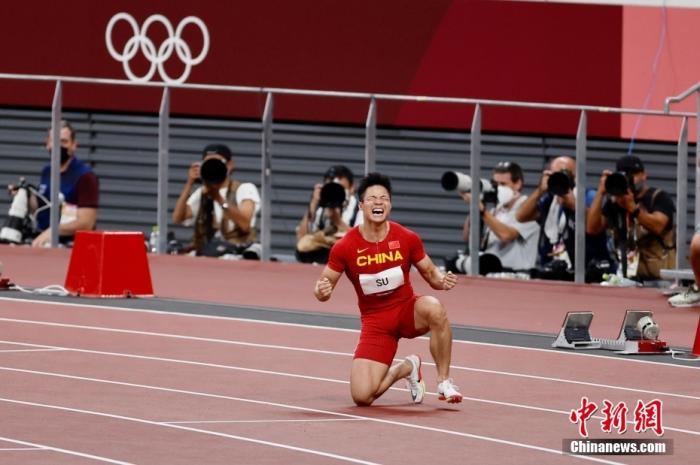(Tokyo Olympics) Halfway through the Tokyo Olympics, how can we finish the games smoothly as the epidemic intensifies?
China News Agency, Tokyo, August 1 (Reporter Zhu Chenxi) The Tokyo Olympics schedule is over halfway, but the current Japanese new crown pneumonia epidemic is getting worse.
In the face of the menacing epidemic, what measures the Japanese government will take to ensure the smooth completion of the Olympic Games has attracted people's attention.
On August 1, local time, in the men's 100-meter semifinal of the Tokyo Olympics, Chinese flying man Su Bingtian set an Asian record with 9.83 seconds, set his personal best and successfully advanced to the final. He was also the first Chinese flying man to enter the Olympic final.
Photo by China News Agency reporter Tomita
Japan's epidemic worsens day after day
In the past few days, the number of new cases in Japan and Tokyo continues to set new records.
On August 1, Japan had more than 12,000 new confirmed cases, and Tokyo had more than 4,000 new cases, and there were more than 3,000 new cases in a single day for the fourth consecutive day.
The confirmed cases of Olympic-related personnel have continued for a month.
The Tokyo Olympic Organizing Committee announced that 18 Olympic-related personnel tested positive for the new crown virus. Since July 1, the cumulative number of confirmed cases has reached 259.
Is there a connection between the spread of the epidemic in Japan and the hosting of the Olympic Games?
In this regard, the International Olympic Committee recently stated that the spread of the Tokyo epidemic has no connection with the hosting of the Olympics, and emphasized that the Tokyo Olympics participants are in isolation from the outside world and that the Olympics will not have an impact on the prevention and control of the epidemic in Japan.
Tokyo Governor Yuriko Koike also said that the hosting of the Olympics has increased the home-stay rate of the people, and more people stayed at home to watch the games, reducing the flow of people going out, thus denying that the Olympics have worsened the epidemic.
However, Japan announced that health experts believe that the intensification of the epidemic is caused by multiple factors.
The Japanese government's new crown epidemic expert group Shigeru Omino recently stated in the Diet that the Japanese people's accustomedness to the epidemic, the spread of the mutant virus delta strain, the Tokyo Olympics and the increase in the flow of people during the summer are the main reasons for the expansion of the epidemic.
"Bubble" still has loopholes to plug
For athletes, staff, media and other Olympic-related personnel, the Tokyo Olympic Organizing Committee adopts the current "bubble epidemic prevention model" commonly used in international events, that is, wrapping relevant personnel like "bubbles" to block contact with the outside world.
Based on the protection of "bubbles", infections in the Olympic area are controlled at a relatively low level.
The Tokyo Olympic Organizing Committee spokesperson Masatsu Takatani introduced at a press conference on July 31 that the positive detection rate of the new crown screening in the Olympic area was 0.02%.
However, since the opening of the Tokyo Olympics, there are still situations that have aroused concerns from the outside world.
Recently, the news that two referees of the Tokyo Olympics went out without authorization after being diagnosed with new crown pneumonia, aroused concerns among Japanese people.
According to Japanese media reports, the two referees were arranged to be isolated in a hotel after the diagnosis, but they ignored the regulations and went to the hospital for a test on their own to prove that they were negative.
It is reported that this is the first occurrence of Olympic-related personnel going out without authorization after the nucleic acid test result is positive.
In addition, two Olympic athletes who won silver medals recently left the Olympic Village to travel privately after the game ended and were deprived of the qualifications to continue participating.
Health experts pointed out that there are still loopholes in the "bubble epidemic prevention model" of the Tokyo Olympics, and called for further restrictions to improve the quality of the "bubble".
The emergency continues to expand
Due to the rapid spread of delta mutant strains in Japan, the Japanese government recently decided to extend the "Declaration of Emergency Situations" to the three prefectures of Kanagawa, Saitama, Chiba Prefecture and Osaka Prefecture in the metropolitan area near Tokyo. The date is August 2. From January to August 31.
Currently, Tokyo Metropolis is in a state of "emergency declaration", so starting from the 2nd, the Japanese metropolitan area will enter this state.
Hosting a "safe and secure" Olympic Games is the Japanese government's long-standing commitment.
Olympic venues are mainly concentrated in the capital area. Expanding the scope of the "emergency declaration" will create a more "safe and secure" environment for the Olympic Games.
In the face of the menacing epidemic, Japanese Prime Minister Yoshihide Suga expressed his determination to make this emergency declaration "the last time."
The successful completion of the Olympic Games is also inseparable from the active cooperation of the participants in the epidemic prevention regulations.
The Tokyo Olympic Organizing Committee stated at a press conference on August 1 that, as of now, six Olympic-related personnel, including Olympic athletes, have been deprived of their qualifications for violating the provisions of the Epidemic Prevention Manual.
The Tokyo Olympic Organizing Committee stated that it will promptly notify the relevant parties of the situation after each penalty is imposed, which will have a certain effect on preventing the recurrence of such incidents.
As the schedule advances, the epidemic prevention work for the Tokyo Olympics is constantly revised and improved.
At present, the Japanese government is making every effort to fulfill its promise to host a "safe and secure" Olympic Games.
(Finish)

